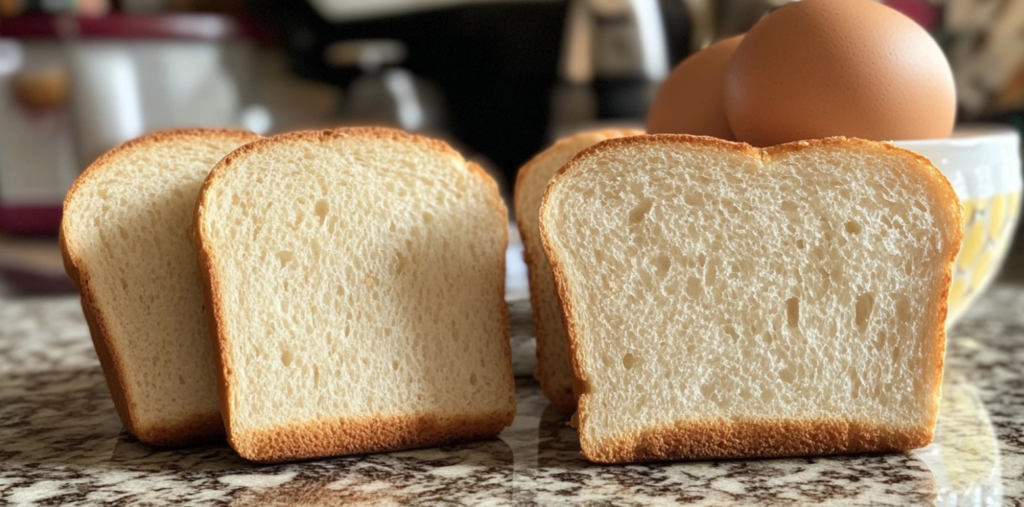Table of contents
- What Happens if You Add an Extra Egg to Bread?
- The Role of Eggs in Bread Dough
- What Happens When You Add an Extra Egg?
- Texture and Flavor Changes
- Adjusting Other Ingredients When Adding an Extra Egg
- Common Mistakes When Adding Extra Eggs
- The Impact on Dough Hydration and Gluten
- Recipe Variations That Benefit from Extra Eggs
- Nutritional Benefits of Adding More Eggs to Bread
- FAQs
- Conclusion
What Happens if You Add an Extra Egg to Bread?
What happens if you add an extra egg to bread: Baking is a delicate process that requires precise measurements, especially when it comes to ingredients like eggs. Eggs are vital in many bread recipes, playing several roles that impact flavor, texture, and structure. But what happens when you add an extra egg to your bread recipe? Let’s dive into the science behind it and the changes you can expect.
The Role of Eggs in Bread Dough
Eggs are used in bread dough for various reasons:
- Structure: Eggs help bind the dough together, giving it more structure.
- Moisture: They add moisture to the dough, making the bread softer and richer.
- Leavening: Eggs assist in rising, particularly in enriched dough like challah or brioche.
These benefits result from the proteins and fats found in eggs. Egg whites provide protein, which strengthens the dough, while the yolks contribute fat, which softens it and adds flavor. This delicate balance affects the final bread product in more ways than one.

What Happens When You Add an Extra Egg?
Adding an extra egg to a bread recipe can lead to several noticeable changes:
- Texture: The additional egg will make the bread softer, creating a more tender crumb. Expect a lighter, fluffier texture.
- Moisture: Since eggs add moisture, your bread will feel slightly more moist and rich. This is especially useful for sweet breads like brioche.
- Flavor: The bread may take on a more pronounced egg-like flavor, especially if you’re adding yolks.
An extra egg alters both the rise and the structure of the bread dough, making it more flexible. However, you must be mindful of how this change impacts the balance of your recipe.
The role of eggs in bread provides further insight into how eggs impact the gluten formation and texture of bread.
Texture and Flavor Changes
When you add an extra egg, the most noticeable changes occur in the texture and flavor:
- Crumb Structure: Eggs act as emulsifiers, improving the bread’s crumb structure, making it finer and more delicate.
- Tenderness: The additional fat from the yolks will make the bread more tender. It will melt in your mouth, perfect for softer bread types.
- Flavor Profile: Expect the bread to be richer in taste, with a subtle hint of eggs. While this can be delightful in sweet breads, it may not suit all recipes.
The extra fat from egg yolks inhibits gluten development, which results in a softer crumb and less chewiness. This effect is often desired in enriched dough, where the focus is on tender, rich bread.
For more information on this, check out extra eggs in bread baking to see how more eggs can affect recipes like brioche or challah.
Adjusting Other Ingredients When Adding an Extra Egg
When adding an extra egg to your bread recipe, it’s essential to adjust other ingredients to maintain balance:
- Flour: You may need to increase the amount of flour to compensate for the added moisture from the egg.
- Water: Adding extra water can dilute the dough too much, so reduce water by a small amount to keep the right consistency.
- Fat: If your bread recipe already contains fats like butter or oil, consider reducing them slightly to avoid an overly rich and dense loaf.
Getting the right balance ensures that the bread’s texture remains fluffy, not rubbery or dense. Too many eggs can lead to a chewy, almost rubbery texture due to the additional protein and moisture.
Common Mistakes When Adding Extra Eggs
While adding an extra egg to your bread dough can enhance its texture and flavor, there are potential pitfalls:
- Rubbery Bread: Adding too many eggs can make the bread dense or rubbery due to the excess protein.
- Overly Dense Loaf: If you don’t adjust other ingredients like flour and water, the added egg can make the dough too wet, leading to a dense loaf.
- Egg Overload: If you’re baking a bread where eggs aren’t meant to play a prominent role (e.g., baguettes), adding more eggs can overpower the flavor.
The Impact on Dough Hydration and Gluten
When you add an extra egg, it affects the hydration of the dough. Eggs contain water, and adding more increases the moisture content of the dough. At the same time, the fat in the yolk acts as a gluten inhibitor, which is why egg-heavy bread tends to be softer and less chewy.
- Hydration: Eggs add moisture, so reduce the water in the recipe.
- Gluten: The fat from egg yolks weakens the gluten network, which can make the bread softer but less elastic.
If you’re aiming for bread with a more open crumb structure, it’s best to limit the number of eggs to avoid inhibiting gluten too much.

Recipe Variations That Benefit from Extra Eggs
What happens if you add an extra egg to bread: Some bread recipes benefit from the addition of extra eggs:
- Brioche: This sweet bread uses several eggs, giving it a rich, fluffy texture.
- Challah: Another example of an enriched dough that uses eggs for both texture and flavor.
- Cakes and Sweet Breads: These recipes often thrive with the addition of more eggs, resulting in a moister crumb.
These breads use eggs as key ingredients to create a rich, soft texture. Experimenting with egg content in these types of recipes can lead to delightful results.
Nutritional Benefits of Adding More Eggs to Bread
What happens if you add an extra egg to bread: Adding an extra egg to your bread dough provides more:
- Protein: Eggs are a great source of high-quality protein, which can enhance the nutritional value of your bread.
- Vitamins: Eggs contain various vitamins such as B12, A, and D, making the bread more nutritious.
This added nutrition makes enriched breads a good option for those looking for a more wholesome loaf.
FAQs
What happens if I add too many eggs to bread dough?
Adding too many eggs can result in a dense or rubbery texture. Eggs add both moisture and protein, and too much of these can hinder proper gluten development.
Can I replace other ingredients with eggs for more richness?
Yes, eggs can replace some fats, such as oil or butter, to add moisture and richness to the dough. However, you should adjust the balance of other ingredients like flour and water.
How do I balance my recipe when adding extra eggs?
Ensure that you adjust flour and water accordingly to maintain the right dough consistency. Reducing fat and liquid ingredients can help achieve the proper balance.
Conclusion
Adding an extra egg to your bread dough can significantly improve the texture, flavor, and moisture of the bread. While it’s important to adjust other ingredients to maintain balance, the benefits of extra eggs—softer crumb, richer flavor, and improved hydration—are well worth the experiment. Whether you’re making a simple loaf or an enriched dough, don’t hesitate to play around with egg content to find the perfect bread recipe.

